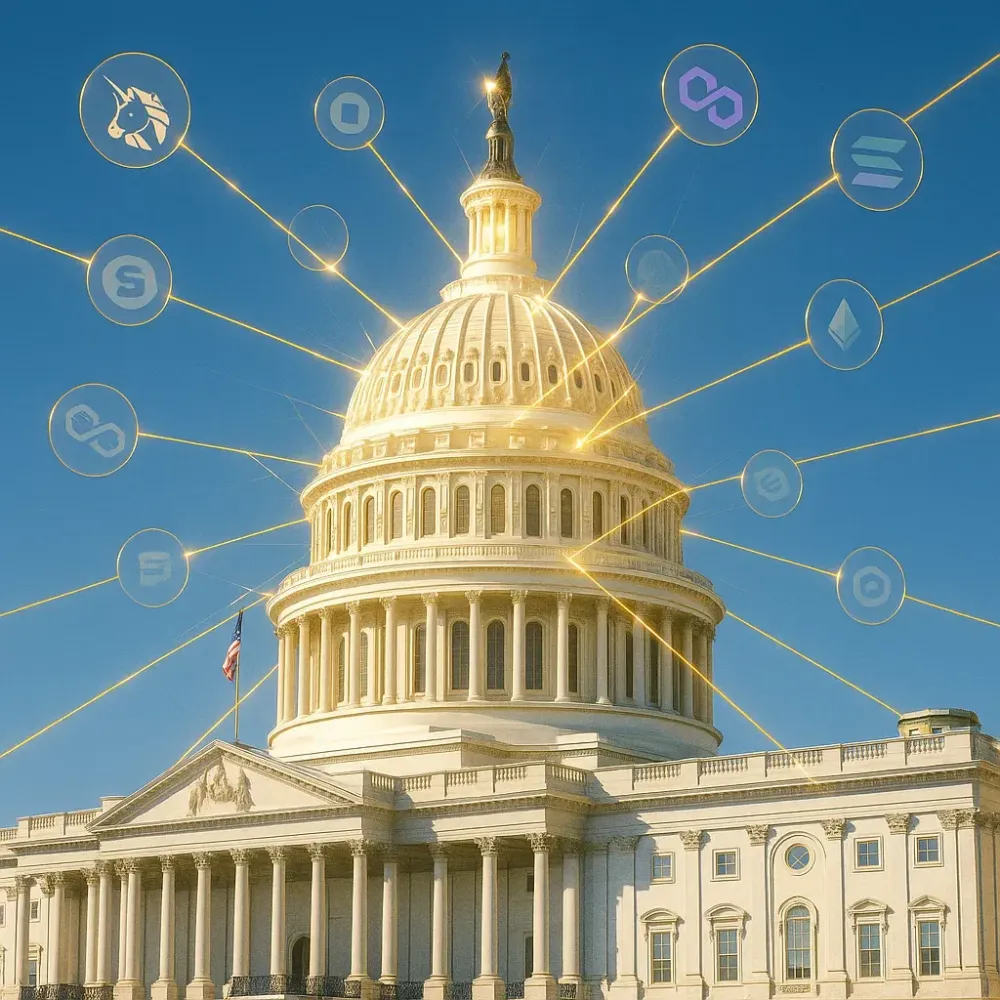Uniswap and 18 Crypto Orgs Urge U.S. Treasury to Clarify DAO Rules
🏛️ Uniswap Rallies 18 Crypto Heavyweights to Push U.S. Treasury on DAO Clarity
The DAO wars just hit Washington. On Sept 2, Uniswap rallied 18 crypto giants — from Polygon to Solana — demanding U.S. Treasury finally give DAOs legal status. At stake: America’s edge in the future of digital governance.
⚡ Quick Hits
- 📅 Date: Sept 2, 2025
- 🏛 Recipients: Treasury Sec. Scott Bessent + IRS leaders
- 🧑🤝🧑 Signatories: 18 orgs (Polygon, Tally, Solana Policy Institute, ZKsync, Morpho, Blockchain Association…)
- ⚖️ Framework: Wyoming’s DUNA law (2024)
- 💬 Political cover: Senator Cynthia Lummis on board
- 📊 Core issue: DAO liability, taxes, contracts, + U.S. competitiveness
✉️ The Letter That Shook D.C.
DAOs aren’t just Discord chats with treasuries anymore. They’re multi-billion-dollar machines powering DeFi, public goods, and open-source infrastructure.
But in the U.S., they’re still legal ghosts. No clear way to:
- Sign contracts
- Pay taxes
- Manage treasuries
→ leaving participants exposed to personal liability.
The Uniswap Foundation called this a competitiveness crisis: innovators are fleeing abroad while America dithers.
Their fix? Adopt Wyoming’s DUNA framework — a legal wrapper that lets DAOs function like entities, while preserving onchain governance. Uniswap Governance itself, one of the largest DAOs alive, could be the test case.
🏛 Political Winds Shift
Crypto’s hill ally, Senator Cynthia Lummis, backed the push:
“We need to build the legal foundation American innovators need to succeed.”
The coalition also tied its pitch to the President’s Working Group Report on Digital Assets, which requires Treasury + IRS to explore rules for blockchain nonprofits.
Translation: the ball is in Bessent’s court.
🌍 The Global Threat
While the U.S. hesitates, Europe, Asia, and the Middle East are already rolling out sandboxes and safe harbors.
The coalition’s warning was blunt:
“DAOs in the US have historically faced persistent legal uncertainty. Many DAOs do not have clarity on whether basic undertakings … will expose participants to personal liability.”
If the U.S. doesn’t act, talent + capital keep flowing offshore.
⚖️ Compliance Meets Decentralization
This isn’t just legal theory. It’s existential:
- ✅ If Treasury acts: DAOs get a federal green light → innovation + legitimacy on U.S. soil.
- ❌ If ignored: DAOs stay offshore → America loses its chance to own the next wave of digital governance.
Bottom line? The DAO wars have officially entered D.C. Whether Washington chooses clarity or confusion will decide if the next generation of governance is Made in America — or built somewhere else.
✍️ TL;DR
Uniswap led 18 crypto orgs in a Sept 2 letter to Treasury Sec. Scott Bessent, demanding legal clarity for DAOs. They cite Wyoming’s DUNA law as the model, with Senator Lummis backing the move. Without federal guidance, DAOs can’t sign contracts, pay taxes, or avoid liability — pushing U.S. innovation abroad. Globally, competitors are already courting DAOs. Treasury’s next step could define whether decentralized governance is built in the U.S. or everywhere else.

Recent News
All Time High • Live
Have questions or want to collaborate? Reach us at: [email protected]










